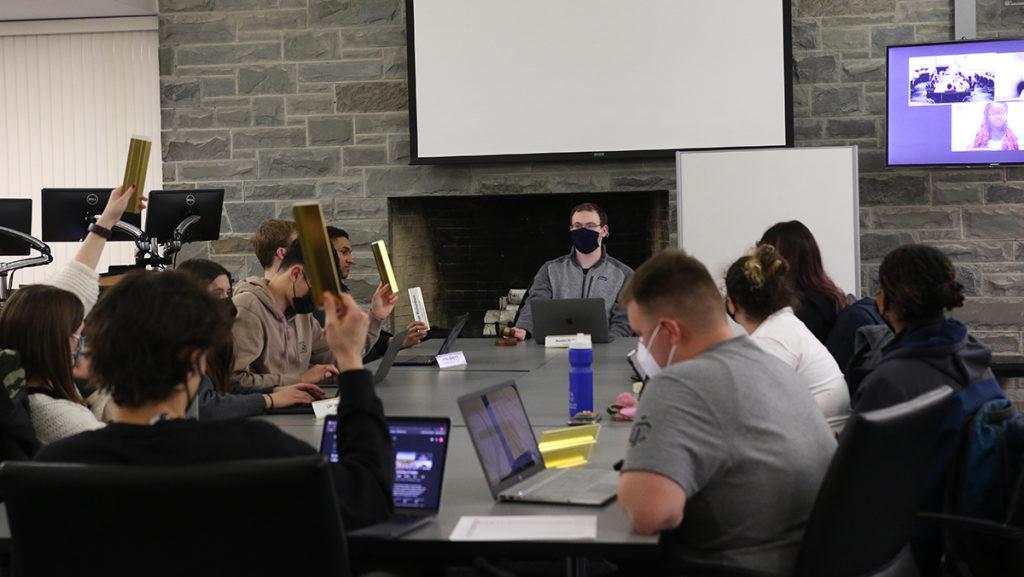At its March 21 meeting, the Ithaca College Student Governance Council (SGC) discussed how the SGC can support the Martin Luther King (MLK) Scholar and First-Gen Programs, as well as advocating to end the COVID-19 health survey requirement.
Shadayvia Wallace, program director for the MLK Scholars and First-Gen Programs, started at the college in August 2021 as director for both programs when in past years, the programs were run separately. Each year, the college supports 60 MLK Scholars, which are self-identified students of color committed to social justice who study civil and human rights through the program. The college also records that about 15% of each incoming freshman class identify as first-generation, which are students whose parents did not attend and graduate from a four-year residential college in the United States. Wallace runs everything for these programs, from supporting students’ individual needs and planning events to collaborating with offices like the Office of Career Services and the Division of Philanthropy and Engagement.
Wallace said her main goal is to bridge the gap between herself as director and the students. The programs meet together once a month all together and Wallace said she has started meeting with each cohort individually because she found there was a need for more attention to specific students. However, she said there are limitations to what she can do running the programs by herself and with a strict budget.
“My hope is to continue to develop the program,” Wallace said. “I know there’s been a lot of disconnect. Everybody needs the opportunity to feel validated and connected with me.”
Wallace said the most important way to support first-generation students is by letting them know what resources are available to help them. She said the program exists to help students through college without the traditional support systems, like parents, who are familiar with college institutions.
“Visibility is very important and knowing first-gen students and their unique circumstances on how they navigate through school,” Wallace said. “A lot of first-gen students don’t have the same resources [as other students], so I serve as that resource … they can come to me when they have issues or concerns.”
Wallace said she wants to collaborate with the Department of Philanthropy to get more donations. While MLK Scholars do receive a $25,000 scholarship along with additional need-based aid, she said there are other expenses that it does not account for and when students come to her, she cannot necessarily provide sufficient financial help.
“They come to my office for support and I’m like ‘I only have X amount of budget that I have to use for certain things,’” Wallace said. “My pot is very small in what I can do, so I think definitely advocating on your end and recognizing that, yes, the scholarship is helpful, but there are still some gaps with that.”
The college’s annual cost of attendance is $65,527, with $46,610 for tuition and $15,934 for room and board. The Ithaca College Board of Trustees raised the price of tuition by 3.25% for the 2022–23 school year.
“Are there any trends of things you might hear from first-gen students of resources they might want to have at the institution that aren’t as available or accessible?” junior senate chair Austin Ruffino said.
The office for the two programs is within the Center for Inclusion, Diversity, Equity, and Social Change, and Wallace said having a more dedicated space for first-gen students would be really beneficial as well as more funding in addition to the college’s financial aid.
“A big concern that I see amongst first-generation students is there are gaps within their financial-aid award letters,” Wallace said. “The funding that I received is program–based. I don’t have scholarships that I give out directly from my office, but I would love to be able to in the future.”
The SGC gives out several small scholarships to student applicants each year from a total budget of $20,000, and Ruffino suggested sharing that resource to MLK Scholars and first-gen students. The SGC also has a budget it allocates by request to campus organizations to fund programming that Ruffino said would be a great resource for the first-gen student organization that Wallace also advises.
After the SGC ended its discussion with its guest speaker, the council moved into an open agenda where members brought up the redundancy of one of the college’s COVID-19 safety protocols.
Sophomore James Zampetti, vice president of communications, said he is confused why students are still asked to complete the COVID-19 health badge survey that is required to eat in campus dining halls and in some classes.
“I’m wondering what is the purpose of it at this point?” Zampetti said. “I’m in the mindset that it might be best to advocate removing it.”
Members of the SGC were in agreement that there seemed to be no reason to continue and planned to reach out to Samm Swarts, assistant director of Emergency Preparedness and Response, to see about ending the practice. Ruffino said during Spring 2021, the health badge was used to verify that students were completing their required COVID-19 testing while on campus.
“That is, I think, the last time that they [the health badges] were meaningful,” Ruffino said. “I think it came from a really good plan, but now, not so much.”









